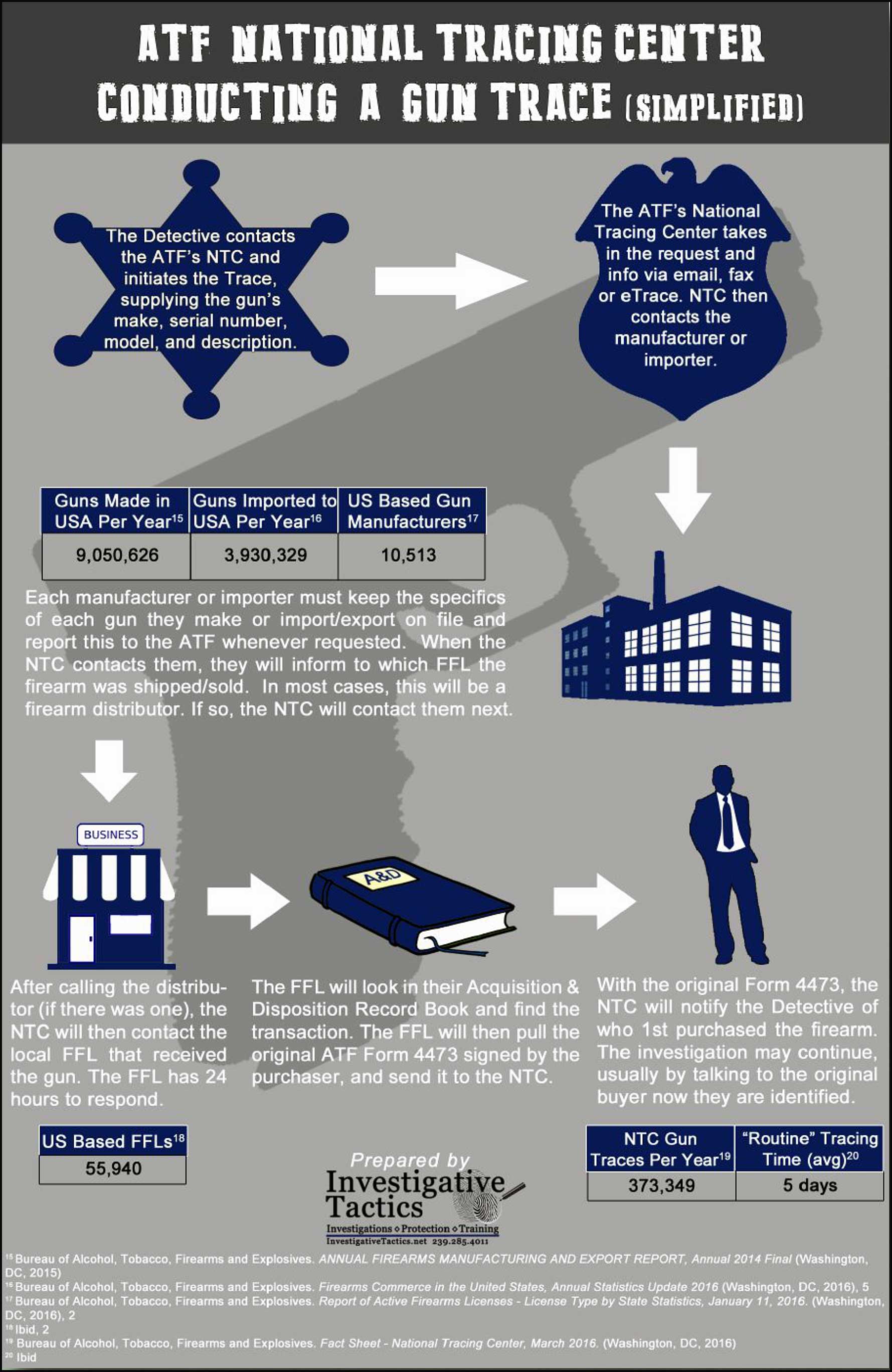
The Bureau of Alcohol, Tobacco, Firearms and Explosives (ATF) is the federal agency authorized to stem firearms-related violent crime and regulate the firearms industry in America.
The ATF National Tracing Center (NTC) assists domestic and international law enforcement agencies by tracing the origin of firearms that have been recovered in criminal investigations.
Firearms tracing through eTrace is the systematic tracking of a recovered firearm from its manufacturer or importer and subsequent introduction into the distribution chain (wholesaler/retailer) to an unlicensed purchaser.
A firearms trace is conducted when a law enforcement agency recovers a firearm at a crime scene and requests information regarding its origin to develop investigative leads.
That information is used to link a suspect to a firearm in a criminal investigation; to identify potential traffickers; and, when sufficient comprehensive tracing is undertaken in a given community, to detect interstate, intrastate and international patterns regarding the sources and types of crime guns.

Pursuant to the Gun Control Act (GCA) of 1968, the U.S. attorney general is authorized to administer firearms tracing. The attorney general has delegated ATF the sole federal agency authorized to trace firearms.
The NTC is only authorized to trace a firearm for a law enforcement agency involved in a bona fide criminal investigation.
ATF eTrace is a paperless firearms trace request submission system and interactive trace analysis module that facilitates firearms tracing and assists ATF efforts to combat firearms trafficking.
The eTrace system provides the electronic exchange of crime gun incident data in a web-based environment with a portal to the Firearms Tracing System (FTS) database.
The system provides real-time capabilities that allow law enforcement agencies to submit electronic firearms trace requests, monitor the progress of traces, retrieve completed trace results and query firearms trace-related data in the FTS database.
In addition, registered users are able to initiate a search of all traces submitted by their law enforcement agency, based on virtually any data field or combination of data elements such as firearm serial numbers, an individual’s name, type of crime, date of recovery or other identifiers.
The eTrace system also provides participating law enforcement agencies with the ability to opt-in to a Collective Data Sharing agreement, through which they can share all of their trace data with any other agencies in their state that also opt-in.
The end result is a state-level collective data sharing pool through which agencies that have opted-in will be able to access trace data for other participating agencies within their state.

The benefits of eTrace include the ability to:
-
Develop investigative leads
-
Significantly reduce the turnaround time required to process a trace request
-
Improve quality of trace-related information because of real-time data validation
-
Monitor the status of traces
-
View/print/download completed trace results, and
-
Generate statistical reports and perform online analytical research
The eTrace system allows a law enforcement agency to conduct comprehensive traces of recovered crime guns and establish an information platform for developing the best investigative strategies to reduce firearms-related crime and violence.
The application is available 24/7 and is provided free of charge to authorized law enforcement agencies.
Each participating law enforcement agency must sign a memorandum of understanding with ATF.

ATTORNEY GENERAL LAW ENFORCEMENT DIRECTIVE NO. 2018-4

TO: All Chief Law Enforcement Officers
FROM: Gurbir S. Grewal, Attorney General
DATE: August 22, 2018
SUBJECT: Directive Instructing All Law Enforcement Agencies in New Jersey to Participate in the U.S. Bureau of Alcohol, Tobacco, Firearms and Explosives eTrace System “Collective Data Sharing” Program
This Directive instructs all law enforcement agencies in New Jersey to participate in the U.S. Bureau of Alcohol, Tobacco, Firearms and Explosives (ATF) eTrace System “Collective Data Sharing” program, and share all crime gun trace result data they receive from ATF with participating state law enforcement agencies.
Law enforcement agencies across New Jersey already endeavor to provide the New Jersey State Police (NJSP) and the Regional Operations Intelligence Center (ROIC) with information about gun crime.
Pursuant to Attorney General Directive 2008-1, these agencies must supply NJSP and the ROIC with information on each crime gun recovered, including the type of gun and the town where the gun was recovered, as well as information regarding any individual(s) involved.
NJSP and the ROIC, in tum, use this statewide data to identify patterns, high-risk individuals, and any individuals violating our criminal laws.

New Jersey law enforcement agencies now have the opportunity to share even more information, which can be used for law enforcement purposes.
These agencies already rely on ATF to provide trace result data for any crime gun recovered in New Jersey.
For each trace request submitted, ATF prepares and forwards a report to the requesting agency, which identifies the manufacturer or importer, the wholesaler and/or retailer, and the first retail purchaser.
However, ATF does not share trace result information with anyone other than the requestor unless the requestor grants ATF permission to do so.
Recently, ATF developed a program called “Collective Data Sharing” which allows law enforcement entities in the same state to share the results of the trace reports they receive from ATF on a reciprocal basis.
The process for doing so is simple-the agencies mark their intent to “opt in” to this arrangement through their ATF eTrace account.

NJSP has already agreed to “opt in” to share the information it receives from ATF with other New Jersey law enforcement partners and will therefore receive such information from all other agencies that decide to “opt in” to this program.
Because the overwhelming majority of crime guns recovered in New Jersey are purchased out of state, the sharing of trace information among law enforcement agencies in New Jersey will serve to enhance our ability to combat gun violence and trafficking.
NJSP and the ROIC will collect and analyze this aggregate information to produce intelligence products that identify statewide patterns in sources and types of guns, as well as unlawful purchasers and firearms traffickers.
Therefore, pursuant to the authority granted to me under the New Jersey Constitution and Criminal Justice Act of 1970, N.J.S.A. 52:17B-97 to -117, I, Gurbir S. Grewal, hereby DIRECT all law enforcement agencies operating under the authority of the laws of the State of New Jersey to implement and comply with the following policies, procedures, standards, and practices:
-
All state, county, and municipal law enforcement agencies responsible for enforcing the criminal laws in New Jersey shall inform ATF, via their ATF eTrace account, of their intent to participate in the “Collective Data Sharing” program to share gun trace reports on a reciprocal
-
All state, county, and municipal law enforcement agencies responsible for enforcing the criminal laws in New Jersey shall continue to provide complete and accurate information on all crime guns recovered to
-
NJSP, including the ROIC, shall provide law enforcement agencies with technical support necessary to comply with this Directive. Law enforcement agencies may also consult with ATF on technical questions regarding eTrace and its “opt in”
-
All law enforcement agencies shall begin the ATF eTrace “opt in” process within 30 days of the date of the issuance of this
-
The goal of this Directive is for agencies to share trace information to further investigations and efforts to combat gun violence and trafficking in New Jersey. Nevertheless, there may be cases where a law enforcement agency has a concern about sharing information in a particular trace report. In such instances, the law enforcement agency may contact the ATF National Tracing Center, through the “Contact Us” link located in the email accompanying the eTrace report, to designate the trace report being submitted as “Sensitive.” Upon such designation, ATF removes the Sensitive Report from any shared database. Law enforcement agencies should exercise this option only where the agency’s chief law enforcement officer determines that sharing the trace information would jeopardize the safety of individuals involved in an investigation or otherwise compromise an The Director of the Division of Criminal Justice will conduct a yearly audit of the use of the “Sensitive” designation by law enforcement agencies in New Jersey to ensure compliance with this Directive.
This Directive shall take effective immediately. The provisions of this Directive shall remain in force and effect unless and until it is repealed, amended, or superseded by Order of the Attorney General.
Gurbir S. Grewal, Attorney General
August 22, 2018
Fast Facts
-
The National Tracing Center assists domestic and international law enforcement agencies by tracing the origin of firearms that have been recovered in criminal investigations.
-
A firearm trace is conducted when a law enforcement agency recovers a firearm at a crime scene and requests information regarding its origin to develop investigative leads.
-
eTrace is a paperless firearms trace request submission system and interactive trace analysis module that facilitates firearms tracing and assists ATF’s efforts to combat firearms trafficking.
















